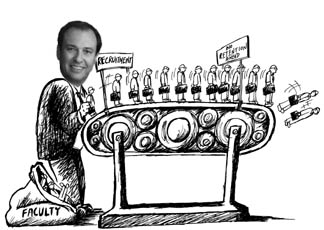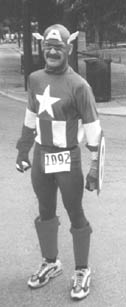Penny wise, pound foolish?
UK puts faculty recruitment ahead of retention
By Alex De Grand
Ever hear the one about the kid who trades a dollar for four dimes because he figures four is greater than one, exchanging later the dimes for 20 pennies because 20 is greater than four?
Some are wondering if that kid grew up to be Charles Wethington, president of the University of Kentucky.
Wethington is accused of focusing funds on recruiting new faculty even as older, more experienced professors leave. Wethington's critics argue some resources should also be used to entice distinguished faculty to stay at UK.
The issue came to a head this spring when Wethington nixed a history department proposal to use an endowed chair for retaining Dr. Lance Banning.
An endowed chair provides its recipient with a salary supplement and money to fund research as well as offering a degree of recognition.
Banning, a historian specializing in the early American republic, has a lengthy list of honors and academic distinctions. In 1995, his book, The Sacred Fire of Liberty: James Madison and the Founding of the Federal Republic, was a finalist for the Pulitzer Prize.
"[Banning] has been an outstanding member of the faculty who enhances the reputation of the department," said Jeremy Popkin, the chairman of the history department during this past academic year.
Popkin said his department was interviewing candidates from outside UK to take an endowed chair when they learned Banning was under consideration for a similar position at Notre Dame University.
"In this particular case, the applicants [for UK's endowed chair] were good people, but the level of Dr. Banning's work is better and the cost of losing Dr. Banning outweighed the gain [of a new faculty member from outside UK]," Popkin said.
Popkin said everyone knew that Wethington had mandated that the endowed chair had to go to someone from outside the university. But presented with this situation, Popkin said, "We were led to believe there might be a change [in Wethington's position]."
Consequently, Popkin said, Banning was offered UK's endowed chair as a way to retain him. The deal was contingent upon Wethington's approval.
The agreement received overwhelming support from the faculty of the history department and was making its way up the university's chain of command when Wethington struck it down.
"We questioned for a moment to make an exception, but decided against it," said Chancellor Elisabeth Zinser, explaining that the administration noted other departments with endowed chairs successfully complied with the requirement of hiring faculty from outside UK.
"We felt we would gain more than we lose if we held our feet to the fire and stuck with picking the best people [outside UK]," Zinser said, adding the issue often boils down to doing the most with scarce resources.
Wethington's decision disappointed many faculty. Some complained the endowed chair initiative and the school's larger campaign to become "America's next great university" is afflicted with the "Kentucky Syndrome."
"The Kentucky Syndrome is the idea that good can only be found somewhere else [other than UK]," said Wolfgang Natter, a geography professor and vice president of the UK chapter of the American Association of University Professors.
"We have professors here doing good work less supported than it would be at other schools and yet they are still making an impression," Natter said. "[The Kentucky Syndrome] is a slap in the face to good, productive faculty."
A number of faculty - including Banning himself - are wondering how UK expects to build itself up as a top-tier national university if it can't retain as well as it recruits.
"They're in danger of losing, year by year, people better than the new people they hire," Banning said, adding that the school will do well just to stay where they are in national rankings at that rate.
Zinser cautioned against jumping to hasty conclusions.
"Obviously, we don't want to lose faculty, but it happens at all schools," she said.
"To look at this [situation with Banning] as the tip of an iceberg... and to generalize [a trend] is misleading," she said.
But Banning suggested there is more evidence of a trend than Zinser is acknowledging.
Banning said the history department has seen other important faculty leave recently and he is still considering departing.
"The demoralizing message to other faculty is that you have to get out of UK to move up," Banning said.
Popkin said the school's emphasis on recruitment without equal attention to retention carries an unfortunate implication.
"It points to a general problem that the faculty here who have shown their dedication to UK beyond those coming in are not being rewarded on the same level as those coming in."
Star Spangled Sprinter
With nearly 3,000 runners and walkers finishing the July 4th Bluegrass 10,000, Main Street and Richmond road was a sea of faces. But one stood out. Captain America.

Yep. Mr. America has been running the race costumed since 1994, and has run every single Bluegrass 10,000 (though before '94, he ran the races as the mild-mannered Tim Bailey). He has dressed up as Space Ghost, Spider Man, and a Teenage Mutant Ninja Turtle in addition to his Captain America get-up, and he likes to hand out t-shirts and business cards to the kids along the route. "This one's gotten so hard to win anything in, I just kind of have fun with it," then he adds, "for the kids."
He might've said more, but it was at that point, we lost him (deadlines leaving insufficient time for cross-training).
It's a good thing Bailey's around to liven up the Bluegrass 10k, because its character pales in comparison to the comparable big road races in the area. The Kentucky Derby Festival miniMarathon in Louisville boasts plenty of freaks among the participants (including Elvis), and the Arts Fest River Run in Evansville, Indiana, gives away $250 to the best costume every year.
Captain America (or some other superhero) will likely be back in August for A Midsummer Night's Run. -ST
Listen to this
UK's presidential search committee is on a "listening tour" to get feedback about what the state wants to see in the president of the "next great university." With any luck, maybe they'll listen a little harder than they did last time around (when Wethington - a guy who had community college written all over him - was railroaded through). Maybe they'll even check in with their own faculty, who had few kind words for Wethington when he arrived (and who probably have fewer now).
Check the number and please dial again
GTE and union officials resumed contract talks June 27. Union spokesman Mike Garkovich said the two sides are schedule to bargain July 5 and 6 before taking a break until July 17.
The union is working under an extension of the old contract that expired June 3. The union voted last month to strike if negotiations fail.
In a hopeful sign, Garkovich said the company has withdrawn two proposals to which the union objected. The first was a plan to pay technicians no more for travel time on after-hours calls than 30 minutes one way. The other was to take away a technician's privilege to take home a company vehicle for a non-vehicular disciplinary matter. - ADG